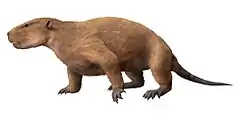| Kimbetopsalis Temporal range: - Middle Puercan, | |
|---|---|
| Scientific classification | |
| Domain: | Eukaryota |
| Kingdom: | Animalia |
| Phylum: | Chordata |
| Class: | Mammalia |
| Order: | †Multituberculata |
| Family: | †Taeniolabididae |
| Genus: | †Kimbetopsalis Williamson et al., 2016 |
| Species: | †K. simmonsae |
| Binomial name | |
| †Kimbetopsalis simmonsae Williamson et al., 2016[1] | |
Kimbetopsalis simmonsae was an ancient mammal (a multituberculate) which was first discovered in 2015.[2][3] It lived about 65.5 million years ago, at least a million years after the non-avian dinosaurs went extinct.[4]
References
- ↑ Willamson, T.E.; Brusatte, S.L.; Secord, R.; Shelley, S (2016), "A new taeniolabidoid multituberculate (Mammalia) from the middle Puercan of the Nacimiento Formation, New Mexico, and a revision of taeniolabidoid systematics and phylogeny", Zoological Journal of the Linnean Society, 177: 183–208, doi:10.1111/zoj.12336
- ↑ Gill, Victoria (2015-10-05). "Newly discovered mammal species survived dinosaur extinction - BBC News". BBC News. bbc.co.uk. Retrieved 2015-10-05.
- ↑ Fossil find: UNL undergraduate discovers new mammal species, University of Nebraska–Lincoln, retrieved October 5, 2015
- ↑ Carolyn Gramling, Sarah Shelley (image): How mammals took over the world. ScienceNews; June 7, 2022. – Includes live reconstruction.
This article is issued from Wikipedia. The text is licensed under Creative Commons - Attribution - Sharealike. Additional terms may apply for the media files.

